#That's a complete lie I also care about Bo-katan calling Din Grogu's father
Text
Everyone: Mandalorian season 3 teaser!! February 2023 release date!! The drama!!!
Me: KATY O'BRIAN'S UNIDENTIFIED COMMS OFFICER SURVIVED
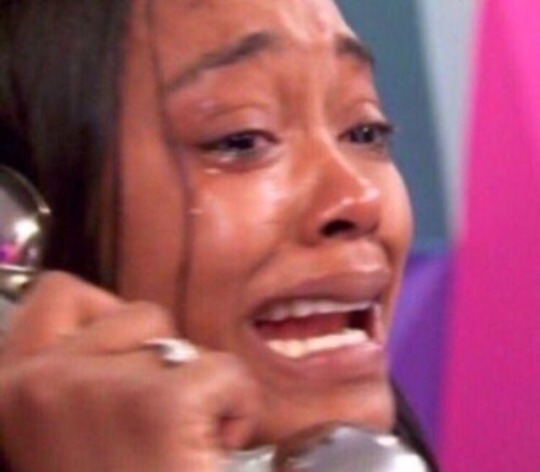
#This is the only thing I care about#That's a complete lie I also care about Bo-katan calling Din Grogu's father#I also also care about Bo-katan#Please don't do her dirty s3#The Mandalorian#the mandalorian season 3#Mandalorian#Din Djarin#Grogu#clan of two#clan mudhorn#Mandalorian season 3#Mandalorian s3#bo katan kryze#unidentified comms officer#Dr. Pershing#the armorer#Star wars#star wars the mandalorian#Star wars memes#The mandalorian memes
42 notes
·
View notes
Text
The Mandalorian: Is He “Better Vader”?
This may sound funny, but please hear me out for a moment.
The further I watch Star Wars’ new live-action tv show, the more I get the impression is that Mando is meant to be a positive version of Darth Vader (the “dark father”).
Father figures usually don’t have a thankful role in this galaxy - either they are absent like Anakin’s, terrifying like Luke’s, or well-meaning but failing in their primary duty of keeping their child safe, like Ben’s.
Not a few fans, though a little mockingly, like to call Kylo Ren “better Anakin” since his conflict is more fleshed out and the whole figure inspires more sympathy. My theory: is Mando meant to be “better Vader”?
It was repeatedly and amply shown that the cause for the never-ending conflicts in the galaxy lie for a large part on the side of the Jedi, whose stuck-up attitude ultimately failed. Their order prohibited personal attachments, and even the wisest among them were not affectionate. This was what drove the all-powerful but passionate Anakin, who desperately wanted to have someone he could love and protect, to his ruin: the moment he finally became a father he also became a ruthless monster. Mando is introduced as a merciless bounty hunter, but as he opens up to the child, he becomes kinder and begins to find friends. He grows even more valiant, but also learns how to be gentle and caring.
Since the Jedi are almost all extinct, but Force-sensitive children still are born throughout the galaxy, we are left with the question of what is to become of them. Some were brought to Luke’s new temple later, but we can assume that not all were identified.
Mando’s little protegee is staying and making life experiences with a guy who doesn’t know anything about the Jedi and has no clue of the source of the child’s mysterious powers, but instinctively does the right things: he keeps him safe, instructs him, scolds him when necessary, and offers him friendship and companionship. (The Mandalorian who adopted him probably was a good father figure, too.) The child never sees his “father’s” face, but nevertheless he trusts him explicitly. Mando is the living proof that coolness and fighting qualities are not opposed to being gentle and caring.
Ben Solo’s tragic fate was the result of failed fatherhood: Luke did not know how to be a father because he had no children of his own and had had no role model, while Han did not trust his capacity to protect his son from his own powers.
The Parallels
Both Vader and Mando are soldiers. Though not Force-sensitive, Mando is extremely strong and well-versed in martial arts; he never shows his face; he wears an armor completed by a black cape which does not seem to have much practical use. He usually speaks only in short, clipped sentences and has a wry, sarcastic kind of humor.
Vader was a follower of the Emperor, factually a slave who had no choice but to obey his master, and wherever he went he wreaked terror. Mando does take jobs from the bounty hunter’s guild, but essentially, he is a free man and often offers his services negotiating on his own terms. Noticeably, he fights against raiders and mercenaries or remnants of the Empire, peace following in his wake.
When he first reaches out for the baby, it looks like the opposite to another famous scene in the saga: here we have the adoptive but good father, while the other was the biological but cruel father. Luke did not take his father’s hand, while the baby instinctively reached out to the man who had protected him.
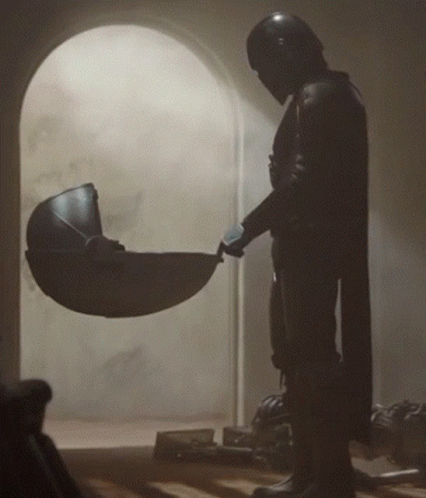

Note also the scenic reversal: one figure is standing on the right side, hand with upturned fingers reaching out into a void, the scene is bathed in cold light. The other figure is standing on the left, hand reaching down, illuminated by warm light.
When we do see his face once, Mando is lying down and helpless like Vader; he is not disfigured though and despite being injured, he is not dying. Shortly after this he finally accepts his task as the child’s father figure, while Vader died a few minutes after his unmasking and could not fulfil his fatherly task any more. Also, in both cases we learned the person’s real name not long before the mask went off: Anakin Skywalker respectively Din Djarin.
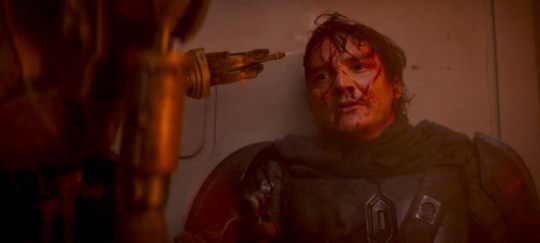
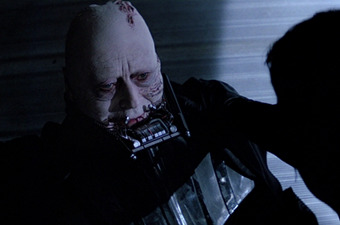
Given the saga’s love for cyclical narrative, this would make a lot of sense. Star Wars is telling us once more how important a protective and kind father is for a child, both as a role model and an attachment figure. We do not know yet how baby Yoda will turn out; but it would have made little sense for the storytellers to think up such a figure in the first place if they didn’t want him to go another (possibly better) way than his more famous predecessor.
Is the galaxy at last healing after the terrible conflicts caused by both Jedi and Sith, and will the good fathers be responsible for a better future, maybe even for the long-awaited Balance in the Force? I hope so.
May the Force be with the Clan of Two. 😉
(On a side note: Vader / Anakin was in his mid-forties when he died. Din Djarin is about the same age.)
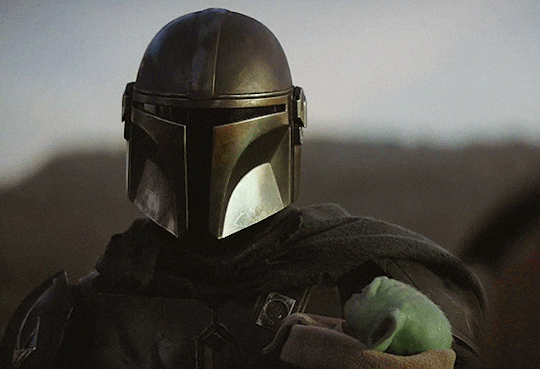
After the closure of Season 2, I would like to add a few details that also set Din Djarin apart from Anakin.
Attachment vs. Affection
Anakin’s greatest weakness was his anxiety to lose the ones he loved. In the end, he sacrificed all of his ideals for the purpose of saving his pregnant wife. Luke also loved his friends and wanted to save them, but in that fateful moment before Palpatine, he realized that he would have had to give up his integrity for the purpose, and that was when he decided to throw away his weapon.
Din suffers deeply when he has to give up “his” child to a literal stranger for an indefinite time. However, he knows that it must be done because he does not have the knowledge to train him. Grogu also, reluctantly, lets go when he sees that his “father” is doing the same. This goes to show, again, that he is much stronger than Anakin.
Following Rules vs Following One’s Heart
Like Anakin / Vader, Din takes his helmet off the moment he has to say goodbye to his child. The famous sentence “Just once, let me look on you with my own eyes” comes to mind. Vader was a Sith Lord and Anakin had been a Jedi. Both adhered strictly to their code: Anakin was a faithful Jedi until he became a Sith and Vader obeyed to the rules of the Sith until for a brief moment he acted like a Jedi again (and, also, like a father, which was a first). Mando unmasks not only before Grogu but also
- Luke, who is a total stranger
- Moff Gideon, an enemy
- Bo-Katan, a possible potential enemy since she pursues the Dark Saber
- Fennec, an ally but not a friend
- Cara, a friend who never saw his face.
That he is willing for all of them to witness the moment he lifts his incognito shows that Mando is finally listening only to his heart. The Way of the Mandalore, which was his guideline for his entire adolescence and adult life (i.e. thirty years or more), has become less significant to him than the bond he has with Grogu.
Anakin’s tragedy was that he could not follow his heart but that some rules defined by an outside source always were in control. He wanted to be a husband and father and loyal friend, a mechanic and a pilot, not a Jedi or a Sith.
Ben Solo’s tragedy was the same; though not born a slave, he also had no choice about what to do with himself and his life. It was either being a Jedi or a Sith. But we know that he wanted to be a son and a lover, and a pilot.
The same fate occurred to Luke, many years later: the kind-hearted, affectionate young man from Tatooine, who so easily befriended everyone and always was compassionate and helpful became aloof and detached on being a Jedi, because he thought that was what this task required. But in the end, it was exactly what made him not understand and even fear his nephew, with disastrous results.
Din Djarin chose the way of the heart, he is no longer adhering to “the Way”: he said himself that now he can’t put his helmet back on. (Alternatively, he could put it on again, but that would mean defying the Way otherwise.) Grogu has witnessed that a man can very well choose family over a code that was taught to him, even if he adhered to it all of his life. Luke is the one who carries him away, but Grogu looks over his shoulder to his “father”. Luke may become his teacher, but Grogu’s role model, his hero, will always be Din; as it was for Ben with his father Han.
Hints at the Future
Anakin died twice: once on Mustafar, where he also lost his blue light sabre, and on the second Death Star, where he had lost the red one. Din Djarin, at the end of this part of this journey, receives a sabre, although he never wanted it.
With the Dark Saber, a new fate is awaiting Mando. Is his destiny that of being the warrior-king, protective and honorable, that ought to have been Anakin’s place? Maybe. As they say, the best leaders are the reluctant ones. 😊
#star wars#sw#read more#the mandalorian#mando#din djarin#baby yoda#anakin skywalker#darth vader#luke skywalker#han solo#the Jedi#father figures#clan of two#kylo ren#ben solo#greef karga#grogu
393 notes
·
View notes